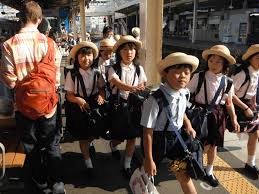
Many western parents might be at first intrigued, and then likely appalled, at how independent Japanese children are encouraged to be. Kindergarten kids can routinely be seen walking alone, even in a big city like Tokyo. It’s not uncommon to see packs of elementary school-aged kids riding the train throughout the city.
Contrast that image with the U.S. view that assumes every stranger is a potential kidnapper, and where parents have even faced criminal charges for letting their kids play a hundred feet from their house, or walk home from school.
Are we really helping our kids by being so over-protective?
But let’s take a step back, maybe disembark from that parent-helicopter from which you’ve been scrutinizing little Johnny’s every move since he first headed out for pre-school. Let’s see if there are lessons to learn from not only the Japanese, but from our own past?
Spring is here, summer is on the way, and with it will come barbecues and neighborhood parties. And anytime you attend one, and you notice the kids running around the neighborhood as evening turns to dusk and see them getting into mischief – or just playing, someone is bound to pipe up with thoughts on “how different things were when we were kids.”
Turns out, it’s true. There was a time when kids stayed out until the street lights came on, walked to and from elementary school, and weren’t indoctrinated to believe that every stranger was out to hurt them.
For the Japanese one big difference in attitude is the cultural sense not so much of self-sufficiency, but rather of group reliance. As reported in The Atlantic, Dwayne Dixon, a cultural anthropologist who wrote his doctoral dissertation on Japanese youth, says that a strong sense of community is key to understanding the independence of their kids:
“[Japanese] kids learn early on that, ideally, any member of the community can be called on to serve or help others,” Dixon said.
And when you think of this cultural difference in terms of the way we are raised in most western countries–and especially in the United States–to be strong and independent, it paints a fascinating picture of our profound cultural loss.
What deep lesson, amazing conversations, tidbits from another’s life, what funny bon mots go unsaid and unheard as a result of our separateness, our inability to converse with a stranger? Imagine what a kid could glean from a conversation with an old lady at the corner shop or a cop or a banker or a fast food worker if he or she were out on their own for the afternoon?
Maybe transitioning from full-on helicopter parent mode to Japanese parent mode is a bit much to ask. Nonetheless, it might behoove us to give our children a bit more room, a bit more rope.
And maybe rather than lament a lack of community we could set out to build one.
Hey, a neighborhood cookout might be a great place to start!
http://www.alternet.org/world/10-new-ways-other-countries-are-actually-solving-problems-and-kicking-our-ass
